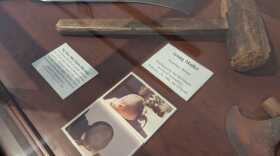Fredericksburg native Daniel Bachman uses the natural world to create his music: Audio from thunderstorms, floods and the quiet of nature is captured and then integrated.
VPM News Morning Edition host Phil Liles sat down with Bachman to discuss his creative origins and his process.
Note: This interview has been lightly edited for clarity and style.
Phil Liles: Good morning to Daniel Bachman, musician extraordinaire, who plays the six-string steel guitar. I thought we'd start with just a little bit of background.
Daniel Bachman: I grew up with a family that took creativity very seriously. My grandfather was a professional musician at one point in his life in the 1940s. My dad was a gigging folk musician from Lynchburg to DC to Richmond at the folk clubs in the 1960s, 1970s, 1980s; that time frame.
I grew up in a really supportive household for being interested in painting and drawing, or writing or making music or whatever. I dropped out of high school at 17 and started pretty much down the path that I'm still on as a formerly touring gigging musician and now mostly just a recording artist and other things that I do.
The style of music that you decided to motivate towards by going out in nature and picking up the sounds and then adding your guitar to that, what brought that all about?
When I was in high school in the mid-2000s, there was a kind of renaissance of different ways of hearing and thinking about music. For lack of a better term, there was a real experimental push at the time. I was always interested in what some people call “musique concrete”: collecting sounds from your environment or your own experience, and then making them into different sounds.
I've always just loved collecting sounds and I've also always had a deep love of nature and the earth sciences. I won't lie, it was not a superficial kind of pursuit at the beginning, but in recent years I have been able to find deeper ways of engaging in the natural communities that we live around and really how to tell stories through these sounds.
Recently, I have found that using natural sounds related to climate change has been a very effective way to get people talking about this; to get people to find empathy with each other and the experiences they’re living through and try to bring more engagement into the arts community talking about stuff like climate change and science.
How do you feel about technology in music and also AI?
I embrace new technology pretty openly. New music that I'm making these days, I wouldn't be able to do unless I had high-powered equipment and editing software and things like that, but I have not embraced AI. I don't exactly know how I feel about it.
Overall, I feel that that particular technology cheapens the work that we do as cultural workers and creative people. I have not found any applications for AI that I am ready and willing to use in my own work that I cannot find better samples from the natural world. You can't get the spontaneity of nature.
You sent me some wonderful tracks of music. One was “540 Supercell” off of your album and film, Almanac Behind. Can you explain that one a little bit?
We spoke a bit about the winter storm that wreaked havoc throughout the region a few years ago. That was the inspiration for that project. I was doing a lot of reading about the effects of extreme weather accelerating as global heating accelerates, and I was looking for ways to talk about that in my own work.
During that winter storm, I just decided to start collecting the sounds that were coming from these weather events, and I started asking friends and family members to record flooding. It was the first time I really found that I could kind of collage all of these different sounds together and really just make them one thing.
I would get the sounds from the natural world and then I would sit down with my instruments whether it be banjo,guitar or whatever, and try to tune my instruments to the sounds of the natural world, meeting them halfway.
That project is about climate breakdown in Virginia and the effects of global heating on our communities. I was really hoping it would be a way to have a way to kind of share these really heavy emotions and these things that we're all living through in a safe environment that you could reflect in.
What was the response from your listeners?
It has been a mixed bag. I do know that it was too intense for some people at the beginning. My personal hope is that it can help energize people to make their own work about these things.
You don't have to be an expert to speak on these things if you're living through the events. And I really do believe that the lived experience that we have living through climate catastrophes and the breakdown of our climatological norms, for lack of a better way of putting it, is something that everyone on Earth is experiencing.
I'm just trying to encourage people to talk about it with their art or their writing or whatever.
Well, it sounds beautiful, scary, but important, and what a better way to educate people. What's your new album title again?
Moving through Light.
Daniel Bachman, thank you so much for taking the time to speak with me.
Thank you so much. It's really been a pleasure.











